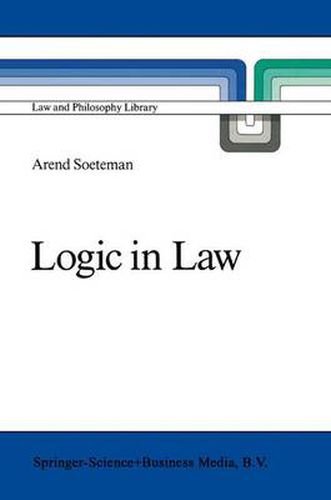Readings Newsletter
Become a Readings Member to make your shopping experience even easier.
Sign in or sign up for free!
You’re not far away from qualifying for FREE standard shipping within Australia
You’ve qualified for FREE standard shipping within Australia
The cart is loading…






This title is printed to order. This book may have been self-published. If so, we cannot guarantee the quality of the content. In the main most books will have gone through the editing process however some may not. We therefore suggest that you be aware of this before ordering this book. If in doubt check either the author or publisher’s details as we are unable to accept any returns unless they are faulty. Please contact us if you have any questions.
The study presented in this book was entered upon by me from a legal point of view. ‘Legal logic’ has been known for a long time, concerning itself with the methodology of legal and in particular judicial reasoning. In modern days, however, this ‘legal logic’ is sometimes also connected with modern formal logic, as it has been developed in the works of G. Boole, A. de Morgan, G. Frege, C.S. Peirce, E. Schroder, G. Peano, A.N. Whitehead, B. Russell and others. For me this gave rise to the as yet not very specific question about the meaning of modern symbolic logic for law. Already in an early stage it appeared that, although traditional legal logic and modern symbolic logic both concern logic, this may not create the misapprehension that a similar matter is at issue. Both concern themselves (among other things) with reasonings and reasoning. Traditional legal logic is, however, as it was said by the German legal theoretician K. Engisch: a material logic that wants us to reflect on what we have to do if we -within the limits of actual possibility- wish to reach true, or at least correct judgements (Engisch, 1964, p.5). Modern symbolic logic on the other hand is not concerned with the truth or correctness of the result of an argument, but with its validity, i.e. the question when or under which conditions the truth (correctness) of the conclusion is guaranteed by the truth (correctness) of the premisses.
$9.00 standard shipping within Australia
FREE standard shipping within Australia for orders over $100.00
Express & International shipping calculated at checkout
This title is printed to order. This book may have been self-published. If so, we cannot guarantee the quality of the content. In the main most books will have gone through the editing process however some may not. We therefore suggest that you be aware of this before ordering this book. If in doubt check either the author or publisher’s details as we are unable to accept any returns unless they are faulty. Please contact us if you have any questions.
The study presented in this book was entered upon by me from a legal point of view. ‘Legal logic’ has been known for a long time, concerning itself with the methodology of legal and in particular judicial reasoning. In modern days, however, this ‘legal logic’ is sometimes also connected with modern formal logic, as it has been developed in the works of G. Boole, A. de Morgan, G. Frege, C.S. Peirce, E. Schroder, G. Peano, A.N. Whitehead, B. Russell and others. For me this gave rise to the as yet not very specific question about the meaning of modern symbolic logic for law. Already in an early stage it appeared that, although traditional legal logic and modern symbolic logic both concern logic, this may not create the misapprehension that a similar matter is at issue. Both concern themselves (among other things) with reasonings and reasoning. Traditional legal logic is, however, as it was said by the German legal theoretician K. Engisch: a material logic that wants us to reflect on what we have to do if we -within the limits of actual possibility- wish to reach true, or at least correct judgements (Engisch, 1964, p.5). Modern symbolic logic on the other hand is not concerned with the truth or correctness of the result of an argument, but with its validity, i.e. the question when or under which conditions the truth (correctness) of the conclusion is guaranteed by the truth (correctness) of the premisses.